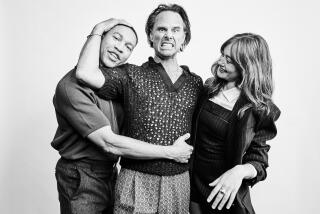Hit by the small-town blues
- Share via
Richard Russo’s 2001 Pulitzer Prize-winning novel, “Empire Falls,” has been turned into a two-part, star-studded HBO miniseries, also written by Richard Russo and directed by Fred Schepisi (“Six Degrees of Separation,” “Roxanne”). Airing Saturday and Sunday nights, it’s a dutiful (self-)adaptation that hits all of the novel’s main points, and while it’s never dull, it’s rarely engaging. Even at a length of more than three hours, it feels underdeveloped. It never breaks into a cinematic vividness: The camera seems remote from the action rather than involved in it, and though the picture admirably has been filmed in the part of the country where it’s set, it doesn’t really communicate a sense of place.
It’s the story of a depressed town in Maine whose inhabitants are either waiting for something to happen or resigned to a world where nothing does. It’s one of those big small towns, familiar from the movies, compact enough to be ruled by a single family and for everyone to know everyone’s business, whatever their standing or circumstances.
The film most specifically concerns two families: the Whitings, who own the town, and the Robys, who -- like everyone else -- just live in it. Among the latter are central character Miles (Ed Harris), who runs the Empire Diner; his formerly wayward brother David (Aidan Quinn), who cooks there; soon-to-be-ex-wife Janine (Helen Hunt), newly thin and about to marry her cocky boss (Dennis Farina); and daughter Tick (Danielle Panabaker), not quite befriending spooky quiet kid John Voss (Lou Taylor Pucci), who will bring a bit of headline-ripped mayhem to the climax. Just across the river are rich and powerful Mrs. Whiting (Joanne Woodward, in what might be termed the Lionel Barrymore role), her crippled daughter (Kate Burton) and dead husband, Charles (Philip Seymour Hoffman), who shows up in flashbacks, along with Miles’ late mother (Robin Wright Penn). There are a lot of sad secrets among them, and the film is largely a matter of getting them out.
Russo emphasizes the movie’s hard-bound origins with chapter headings and a folksy, godly narrator -- a little too reminiscent of Earl Hamner on “The Waltons,” or Tom Bodett for Motel 6 -- who returns again and again to emphasize that the river that runs through the town and story is not merely a waterway but a metaphor. (“Lives are like rivers; eventually they go where they must, not where we want them to.” And so on.) But in most respects all the film does is demonstrate why a movie isn’t a book. The original novel is a long work in which nothing much happens, but it is thick with information; it flits from character to character and roots around in their heads, providing histories and motivations for sometimes their smallest gestures. Conversations run for pages and pages, and while Russo has managed to maintain some of the novel’s talk-for-talk’s-sake, which gives it color and texture, a manageable running time requires that characters unburden themselves of their message and go. The film version has something of a freeze-dried quality -- the constituent elements are there, but the juice has been sucked out.
Harris doesn’t really succeed in making Miles interesting, though we’re interested in him by default, since he’s obviously the hero of the piece. An almost painfully good guy, with a habit of underestimating everyone around him, Miles has a strong sense of duty and obligation coupled with an inability to take any sort of action to improve their lot or his own -- he’s a Hamlet without the soliloquies or sexiness. The desperation in his life is so quiet he imagines he’s happy, in spite of what everyone else seems to think. We wait for him to awake, smell coffee.
As Miles’ father, Paul Newman’s role is easier. His character has no inner life to speak of -- he’s all extravagant surface. His Max -- a close double for Poopdeck Pappy -- is a kind of human hound dog whose life has been dedicated to finding the sunny spot and staying in it as long as possible; he is a good-natured, even good-hearted sociopath. Newman has a history with the author, having played in the film of Russo’s novel “Nobody’s Fool” and in the Russo-co-scripted “Twilight” (both directed by Robert Benton), and it’s easy to see why he would want the part -- its air of vital, disreputable age suits him to a T. The film perks up whenever he’s on screen; even (or perhaps especially) with a scraggly beard and wayward hair, he’s a still-handsome movie star whose movie-star performance provides the movie’s most genuine moments. Only fellow old pro Estelle Parsons fares quite as well, though there is other good work here, especially in some of the smaller roles: Jeffrey DeMunn as a cynical newspaperman and William Fitchtner as a crooked cop who just wants to be liked both stand out.
*
‘Empire Falls’
Where: HBO
When: Part 1, 9-11 p.m. Saturday; Part 2, 9-10:30 p.m. Sunday
Rating: TV-14-VL (may be unsuitable for young children under the age of 14, with advisories for violence and coarse language)
Ed Harris...Miles Roby
Paul Newman...Max Roby
Aidan Quinn ...David Roby
Danielle Panabaker...Tick Roby
Helen Hunt...Janine Roby
Joanne Newman...Francine Whiting
Philip Seymour Hoffman...C.B.
Whiting/Charlie Mayne
Director Fred Schepisi. Executive producers Paul Newman, Scott Steindorff, Fred Schepisi, Marc Platt. Screenplay Richard Russo.
More to Read
The complete guide to home viewing
Get Screen Gab for everything about the TV shows and streaming movies everyone’s talking about.
You may occasionally receive promotional content from the Los Angeles Times.







